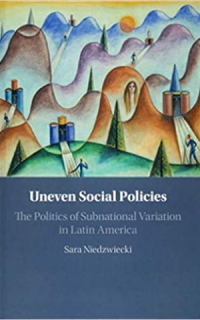Sara Niedzwiecki’s “Uneven Social Policies: The Politics of Subnational Variation in Latin America” asks the important question why some regional and local governments adopt new social programs quickly while others refuse to do it. The study is based on an impressive amount of empirical work consisting of a combination of regression analysis and a comparative case study of two policies (conditional cash transfers and primary health care) in two countries (Argentina and Brazil), four regions and eight localities. Sara Niedwiecki importantly shifts the focus of classic social policy studies from the politics of policy-making to the politics of policy implementation. Connected to this shift of focus are, on the one hand, a shift from the national to the subnational level where central government decisions are put into practice, and on the other hand, a shift from the role of clientelistic distribution of policies towards the political determinants of nondiscretionary policy implementation. As she does so in a scientific and empirical context dominated by comparative politics rather than public policy, her work is a major contribution to the study of social policy in South America. Sara Niedzwiecki’s book transports an utterly important insight from policy studies to the worlds of development studies and comparative politics, namely that policy implementation by no means is the mere mechanical realization of decided policy as mainstream political science still is prone to see it in a scaring persistency. Policy implementation is politics.
Sara Niedzwiecki contrasts two types of social policy. One, there are policies that clearly ‘belong’ to the national government and in which the attribution of responsibility for the policy is very obvious to voters. Second, there are policies that grant much more discretion to the implementing entities so that accountability is more difficult to attribute to a specific layer of government, be it the national or the subnational level. Her argument is that in the first case, local politics has a major incentive to obstruct implementation if the subnational government belongs to the opposition of the central government. In the second case, political alignment does not play an equal role as the subnational authorities can claim responsibility for successful implementation. Third, drawing on the literature on state capacity, she further examines the implementation of national social policies through two additional variables, namely policy legacies and territorial infrastructures, and confirms their analytical added value in accounting for success.
Uneven Social Policy stands out as a rigorous and theoretically important piece in considering the many encounters between policy and politics. Her work is grounded on extensive comparative research that bears relevance beyond the region she is studying and outside of the social policy field.
Sara Niedzwiecki presents us with a great study with important lessons for both comparative systems scholars and public policy implementation research. Comparative politics benefits from the insight that politics does not end with decision-making. Quite the opposite, this is when the true story of public policy takes off. Implementation studies benefit not only from the convincing turn to subnational differences, but even more so from drawing attention to the politics dimension influencing regional decision making. In its ambition to underscore the relevance of state-society relations for state capacity and policy implementation, it broadens our understanding of where state capacity comes from. The study is topical but also somewhat disconcerting research given the socio-economic situation in Brazil and Argentina – redirecting analyses of regional differences from structural features to questions of political choice. Ultimately, Uneven Social Policy is a wonderful and exciting read, captivating not only by thoughtful analysis, but also by deep insights into the dynamics of national and regional social policy-making and implementation. Sara Niedzwiecki’s book is a greatly valuable reference for all scholars who, in trying to make sense of the policy dynamics during and after the pandemic, will have to address the many policy and political variables involved in policy centralization and decentralization.
The jury congratulates Sara Niedzwiecki for this topical, painstakingly thorough, and impressive book.

















